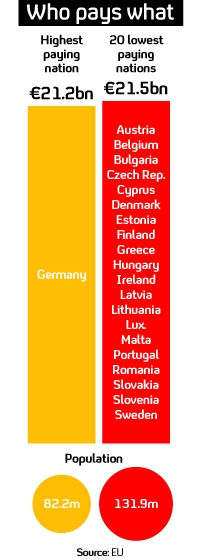Germany needs the EU – despite its Euro-doubts
As David Cameron prepares to meet Chancellor Merkel in Berlin on Friday, tensions between countries within the EU have rarely been higher – and UK-German relations are no exception.

From Germany’s viewpoint, Britain should not be lecturing eurozone countries as they struggle to overcome each new upheaval.
“Schadenfreude”, the deriving of pleasure from the pain of others, might sum up European perceptions of the UK position. From this side of the English Channel, a more charitable interpretation might be “There but for the grace of God…”
But the recent tribulations of Ireland, Portugal, Greece and Italy, together with the emergence of an unelected technocratic elite within the EU, have undoubtedly prompted a resurgence of UK euroscepticism. At the end of October, 111 mainly Conservative MPs voted in favour of a referendum on Britain’s EU membership.

Damaged idea
In Germany, people are also rethinking what the European project means. Business leader Olaf Henkel, in the past a supporter of the euro, told Channel 4 News: “Frau Merkel is all the time demanding stronger savings. In Italy more privatisation. Or another savings round in Portugal.
“If we continue to behave like this as a result of the euro, we shouldn’t be surprised if the wonderful idea of an integrated, peaceful Europe is severely damaged.”
Constanze Stelzenmuller, of the German Marshall Fund, a US-owned think tank, puts the German viewpoint more forcefully: “There’s a sense of everybody hates us, but we’re still responsible for solving their problems.”
At the heart of Germany’s attitude lies the Lutheran Protestant work ethic – the view that “We work really hard and so should they.” In economic terms, Germany sees the southern European countries as having failed to take steps to sort out the supply side of their economies: labour market reform, investment in research and development, and other practices that promote long-term growth.
The German self-perception, by contrast, is that the nation pushed through just such measures in the early years of the last decade – the Schroeder government’s programme of labour market reform, for example.
Euro-doubt to euro-scepticism
Professor Iain Begg of the LSE’s European Institute suggests Germany is not suffering from euroscepticism so much as euro-doubt, whose origins can be traced to the “macro-economic stability culture”, the belief that countries ought to respect the rules, conditioned by the Weimar Republic.
“There’s a concern in Germany that Greece, in particular, broke the rules,” says Professor Begg. “Why should you then help out someone who so egregiously flouted them? Having said that, though, Germany broke the rules in 2002 by not following the stability and growth pact!”
Greeks and Spaniards buying too much is the flipside of Germans being too successful in selling. Prof Iain Begg, European Institute
But the continued success of iconic brands like Mercedes is a reminder that the euro has also helped Germany to sell the things that it makes so well. Preservation of the euro is in the interests of German exporters.
“German exporters are great fans of the euro for a number of reasons,” argues Iain Begg. “Within the rest of Europe they find strong markets, to the extent that much of the imbalance inside Europe is two-edged – it’s Greeks and Spaniards buying too much, which is the flipside of Germans being too successful in selling.”
And any break-up of the euro would force an appreciation of Germany’s currency, making exporters less competitive and forcing them to contemplate the fate of another post-war economic powerhouse, Japan, which has suffered economic turbulence over the past 20 years to the backdrop of a strong yen.




